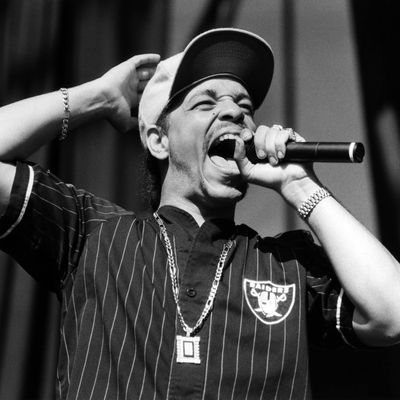
Every time I see Ice-T solve a crime on Law & Order: Special Victims Unit, I cannot help but remark to anyone who will listen that he totally freaked out America in 1992 with “Cop Killer,” a song that he dedicated to his friends at the LAPD. (The topic: shooting pigs in the face.) But as the rapper’s detective turn suggests, hip-hop has become super mainstream in the U.S. Indeed, a quantitative study of songs on the Billboard Hot 100 from 1960 to 2010 found that hip-hop is the “the single most important event that has shaped the musical structure of the American charts,” in the sense that many pop songs since the ‘90s have opted for samples and lyrics over chords. Despite boomer nostalgia, rap has changed American music more than the Beatles, the Rolling Stones, and the rest of the British Invasion.
And yet, for all the penetration that rap enjoys, it still makes people feel uniquely threatened. That’s evidenced in a new University of California, Irvine, study written up by Tom Jacobs at Pacific Standard. In one experiment, participants were asked to respond to a lyrics to a song by the 1960s folk-poppers the Kingston Trio:
Well, early one evening I was rollin’ around
I was feelin’ kind of mean. I shot a deputy down.
Strollin’ on home, and I went to bed.
Well, I laid my pistol up under my head.
Half of the 126 participants were told it was a rap song, the other half told it was country. Then they agreed or disagreed with statements regarding how much they objected to the lyrics, how offensive the lines were, if it was the sort of song that demanded regulation, and if the lyrics were drawn from real-life experiences. The people who thought they were reading rap lyrics had a more negative interpretation than the country group, and they thought the lyrics were more likely to be literally and autobiographically true. This is an exact replication of an experiment done in 1999, when the U.S. was more culturally hostile to rap music.
Jacobs reports that the same results were found when the violent lyrics came from a Johnny Cash song, and that the “rap stigma” was still there regardless of whether participants were told that the songwriter was black or white. Still, it’s astoundingly naïve to think that the bias against rap lyrics isn’t racialized. Rap lyrics have reportedly been used as evidence in hundreds of criminal cases nationwide since 2011. “No other fictional form — musical, literary or cinematic — is used this way in the courts,” wrote University of Richmond researcher Erik Nielson in a 2015 op-ed. It’s “a concerning double standard that research suggests is rooted, at least in part, in stereotypes about the people of color primarily associated with rap music,” he writes. Put more directly, black speech is policed differently than other forms of speech. In 1999, and in 2016.




